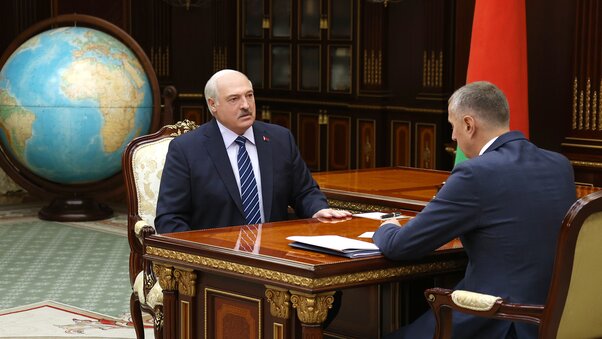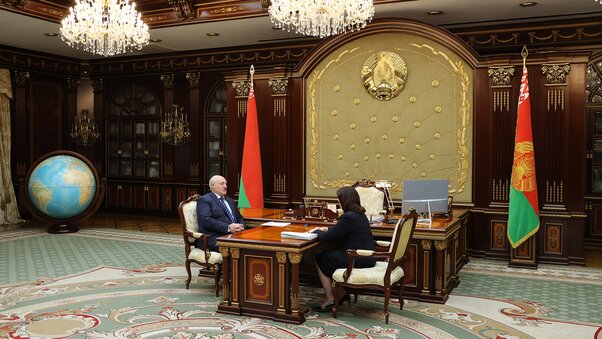Meeting with Governor of Russia’s Ulyanovsk Oblast Alexei Russkikh
- 12
- 10:46
Belarusian President Aleksandr Lukashenko met with Governor of Russia’s Ulyanovsk Oblast Alexei Russkikh.
As he welcomed the Russian delegation, the head of state mentioned the associations that come to mind when the Russian region is mentioned. “Ulyanovsk Oblast has a similar ideology. This oblast is also close to us because the man [Vladimir Ulyanov aka Vladimir Lenin], who stood at the origins of our common state, was born and grew up there. I don’t know your attitude to this but I treat it with reverence because history is important, it has to be respected whatever happened in the past,” Aleksandr Lukashenko said.
The President remarked that Alexei Russkikh had already visited Belarus. He took an active part in a forum of regions of Belarus and Russia in 2022. He was made familiar with Grodno Oblast and visited the China-Belarus industrial park Great Stone. During the current trip the delegation has already been to Brest Oblast and has visited the WW2 memorial complex Brest Hero Fortress and a number of enterprises.
Relations between Minsk and Ulyanovsk have been established for decades. Aleksandr Lukashenko stressed that Ulyanovsk Oblast has always been known for its initiative, creativity, and attention to youth affairs. And it is very important that it pays a lot of attention to vulnerable population categories, to those who need support. “Today we are actively seeking new contact points taking into account the potential that has been accumulated already. We are establishing deeper interaction through manufacturing cooperation ties in the manufacturing sector. The current situation offers an opportunity for reaching a new level of manufacturing cooperation. All the necessary decisions have been made at the level of the heads of state,” Aleksandr Lukashenko stressed.
According to the President, Belarus’ economic ties with Ulyanovsk Oblast rely on the manufacturing sector with a focus on science-intensive technologies. For an example, for a number of years Belarusian enterprises have been shipping their products to assembly lines of the Russian automaker UAZ and the Russian engine manufacturer UMZ. A program for the 2021-2023 period is nearing completion. The realization of a joint project to make semitrailers based on MAZ chassis in Ulyanovsk Oblast continues.
Radioelectronics is another area where solid manufacturing cooperation ties have been established. The Belarusian company Integral supplies a broad range of electronic components, display modules and video monitors to the Russian defense industry.
“I will be very glad to hear your estimates of results of this work. How far have we advanced? What are the problems? Can we completely stop using imported components?” Aleksandr Lukashenko asked Alexei Russkikh.
Speaking about prospects of cooperation with Ulyanovsk Oblast, the head of state suggested using the serious manufacturing capabilities Belarus had inherited from the USSR in order to make various machines, vehicles, and equipment ranging from agricultural machines to equipment used for aircraft repairs. “We have preserved these capabilities and multiplied them. We can use them together today. President Putin and I have agreed on it,” he remarked.
Aleksandr Lukashenko referred to aircraft manufacturing as the most important aspect of technological progress, the assimilation of the latest scientific accomplishments into production.
Aleksandr Lukashenko said: “President Putin and I discussed this topic last week. We’ve agreed to work on the joint production of aircraft for regional transportation. We have the relevant competences for it. I would like to learn what opportunities you see.”
“It is a future-oriented project that will span years. Investments will be massive but the positive effect will be colossal, too,” the President emphasized. He remarked that Belarusian enterprises already make individual components for aircraft manufacturing. He mentioned they are ready to expand the choice of these parts.
The head of state also mentioned Belarus’ readiness to satisfy Ulyanovsk Oblast’s demand for modern passenger vehicles – electrobuses and buses powered by gas engine fuel. Moreover, the region pays a lot of attention to the development of environmentally friendly transport and tries to make it pay its way while keeping the fares affordable for all population categories.
“Apart from that, we make a broad range of trucks, agricultural machines, municipal vehicles, road construction and maintenance machines. We are ready to train personnel and service these machines and vehicles, supply spare parts,” the Belarusian leader noted.
Taking into account Ulyanovsk Oblast’s ambitious plans concerning the modernization of agribusiness, enterprises for storing and processing agricultural products, the Belarusian side suggested sharing its experience and solutions in this sphere.
“Last week you visited China and discussed prospects of cooperation in the sphere of information technologies and digital economy. We have accumulated certain experience of work with China and of using similar high-tech solutions in practice. I suggest pooling our efforts to commercialize them. It is probably time for us to stop fulfilling orders only of Western companies. Our specialists should work more for the benefit of our countries,” Aleksandr Lukashenko suggested.
Apart from that, the President drew attention to cooperation opportunities in such promising areas as biotechnologies, microelectronics, power engineering, and composite materials: “All of it enjoys solid demand on the market today and allows securing the technological sovereignty that we need so much.”
Healthcare and pharmaceutics were also mentioned during the meeting. As a good example of cooperation in these fields Aleksandr Lukashenko mentioned the realization of the Union State project to treat citizens of Belarus and Russia using proton beam therapy.
The head of state went on saying: “We know that Ulyanovsk Oblast is famed for its innovative approaches in the spheres of education and youth outreach. We follow a parallel course. Just like your region Belarus has created a system to support talented young people.”
Taking into account prospects of Belarus’ accession to BRICS, the operation of the Ulyanovsk-based Russia-BRICS international youth cooperation project office looks particularly interesting. The much-needed projects being implemented there include public diplomacy, volunteer movement, preservation of historical and cultural legacy, education, and sport.
Aleksandr Lukashenko said: “I have presented a list of cooperation avenues where we will have to work by complementing each other. The list is far from complete. I am told that the next year’s budget of your oblast is primarily geared towards fulfilling social programs, towards technological development, and the expansion of infrastructure. These are the tasks that mesh well with the topics I have already outlined. If you need our support, you can count on us. I think we don’t have to compete. We should join efforts. There are other parties we can compete with. This is why let’s work together. If you have any questions, problems, feel free to speak sincerely and directly. Today we are ready to make any decisions you may be interested in. We guarantee to you that we will always be dedicated not only to our integration but to our unity in all spheres.”
In turn, the governor thanked Aleksandr Lukashenko for the warm welcome the Ulyanovsk Oblast delegation had received in Belarus. “We didn’t come empty-handed. We brought concrete proposals, which are gainful for all parties and can take relations between Belarus and Ulyanovsk Oblast to new heights. All our proposals sit well with the context of your agreements with our President Vladimir Putin,” Alexei Russkikh said.
He also stressed that Belarus and Ulyanovsk Oblast have a long and very good history of relations. The sides have signed an agreement on cooperation in all spheres and this document gets constantly updated.
Alexei Russkikh went on saying: “We are connected by tight and friendly partnership in all spheres. Starting with manufacturing sector and agriculture and ending with culture and the exchange of social practices. We have been seeing powerful growth of interaction for the last two years. Our representatives keep in touch with Belarusian colleagues and discuss topical matters every month. As a result of this work we have clear understanding of where we should move from now on.”


